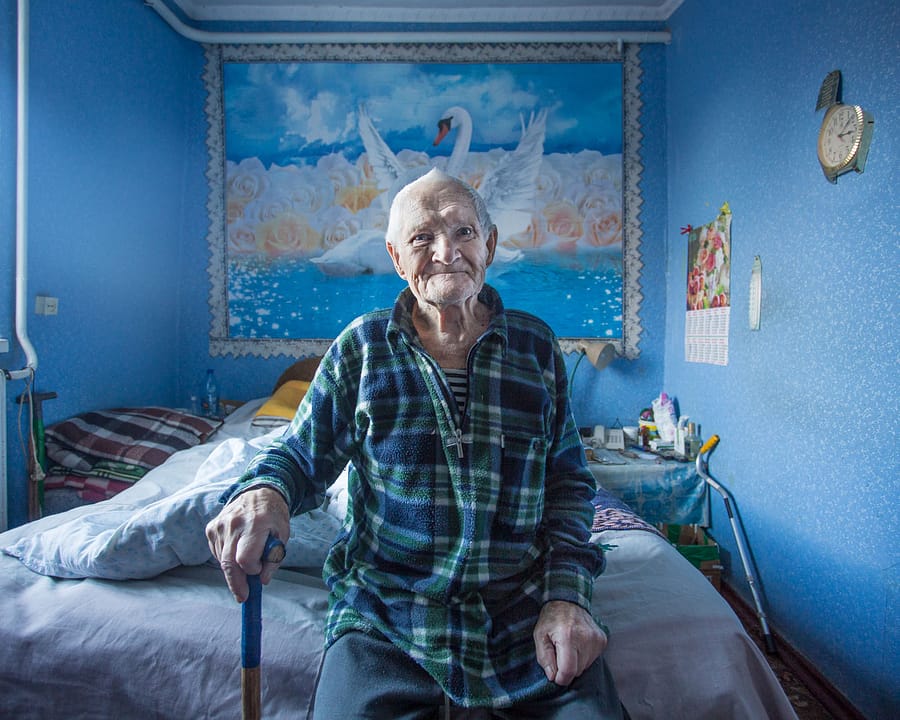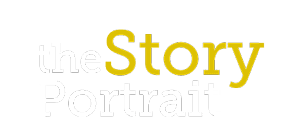
Elderly Jewish Man, Holocaust survivor, Zvenyhorodka, Ukraine // © Barry Falk
Photographer
Barry Falk
The Story behind the Portrait
‘In Search of Amnesia’ is an ongoing photography research project looking into the Jewish narrative in south-east Poland and north-west Ukraine. Starting in January 2017, this long-term project is concerned with memory, how we both remember the past and how it is reinterpreted through the telling of history or buried by collective amnesia. Specifically, it is concerned with how Jewish memory is held within places that suffered atrocity and immense loss. It is also a very personal project exploring my own identity and the family story that I hold.
Ukraine is culturally and religiously significant to Jews and it is the ancestral home to many diaspora Jews in America, Canada and England. Jewish people have lived on these lands for nine millennia and it is a major pilgrimage site for Hasidic Jews. There is talk of a Jewish revival within Ukraine, with vibrant new communities in large urban areas. Nevertheless, there is still an ongoing decline in the Jewish population in the rural areas in the Kiev region, where the communities are ageing, and many younger people are emigrating to Israel.
In November 2019 I returned to Ukraine, this time concentrating on the Kiev region, formerly part of the Russian Empire and the Pale of Settlement, a region that stretched from the Baltic Sea to the Black Sea. My interest was in meeting the small Jewish communities that had survived the numerous pogroms and the Holocaust of the Second World War.
I worked with a guide, Chaim, who drove me to various small towns, some of which had been former shtetls, that still held small Jewish communities. Chaim was more than just a guide though: he has been compiling a historical website on the Jewish communities in the Kiev region for the last five or six years. He’d agreed to take me on a 4-day tour of the region, a scratching of the surface, and I’d specified that I wanted to meet Jewish people, heads of communities, old and young. My specific request was to visit the still existing Jewish communities; I wasn’t seeking to catalogue old synagogues or Jewish cemeteries.
In Zvenyhorodka we met Leonid Brasavskiy, head of the Jewish community who agreed to introduce me to others to see if they would meet me to chat and perhaps be open to being photographed. I was then driven through the small town, trusting completely to my guides, with no clear idea of whom I was going to be introduced to. The first person I met was Elena Alekseevn, a practising Jew though her family was not observant; she was caring for her grandson whilst her daughter and son-in-law worked on a cruise ship in the Crimea.
The second person we visited was an elderly gentleman, featured in the image, a 91 years old man who was very frail and virtually bedridden. When I entered the house, he got up to greet me but his wife instructed him to sit back down again and ushered me into his bedroom. Chaim informed me that he was non-practising and that his wife was not Jewish, however, there was no time to talk just to take pictures. I later learned from Chaim, who had continued a conversation, whilst I took the photos, that he was a Holocaust survivor. I was very aware of his frailty and of my intrusion into their home but also humbled by their openness to me as a stranger, a foreigner with a camera. The man looked at me with his enigmatic face, staring amiably as if used to being photographed, framed by the backdrop of a swooning swan that spanned over him, wings outstretched, like a vision of heaven.
Although our meeting was brief, having this rare opportunity to meet this man & family hugely enriched the wider project. It is this layering of history, both the memories and the inevitable amnesia, that is the contextual soil in which this project sits.
…this long-term project is concerned with memory, how we both remember the past and how it is reinterpreted through the telling of history or buried by collective amnesia. Specifically, it is concerned with how Jewish memory is held within places that suffered atrocity and immense loss. It is also a very personal project exploring my own identity and the family story that I hold.
Bio
Barry Falk is a UK based photographer exploring a range of issues related to the psychological sense of self, how this is embodied in certain spaces and held in particular places that have undergone collective trauma and loss. He has documented key science research centres that are at the forefront of scientific research, asking the questions of what it means to be conscious, sentient and human. He has also focused more extensively on locations further afield, specifically Eastern Europe.
Recently he completed a short Covid-19 Project, titled Undiagnosed, taking portraits of friends and neighbours within walking distance of where he lives, between the period of the first Prime Minister’s ‘stay at home’ speech on 16th March 2020 and his second ‘stay at home go to work’ speech on 10th May 2020.
He is a member of the MAP6 Collective, a group of 9 photographers who create collective, photographic impressions of different places through its landscape and people.
Website and Social
map6.co.uk (Map Collective)
